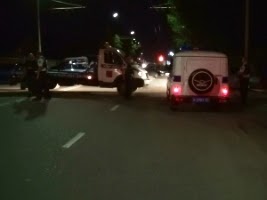
Despite Security Services’ Successes, Kabardino-Balkaria Remains One of North Caucasus’ Deadliest Regions
Publication: Eurasia Daily Monitor Volume: 10 Issue: 151
By:

On August 7, the leader of the united insurgent movement of Kabardino-Balkaria and Karachaevo-Cherkessia, Khasanbi Fakov, was killed in Kabardino-Balkaria’s capital Nalchik. The 34-year-old Fakov was on Russia’s federal wanted list for allegedly staging numerous attacks on law enforcement personnel. The road police stopped a car with Fakov and three other people in Nalchik at midnight. When the suspected rebels started shooting, the police opened fire and killed all four (https://www.regnum.ru/news/kavkaz/kab-balk/1692384.html). The website of Kabardino-Balkaria’s insurgency confirmed the death of Fakov (a.k.a. Emir Abu Khasan), his wife Irina Ortanova and two other militants, Anzor Shaov and Khasan Kushkhov. The website asserted that the rebels were “ambushed” (https://islamdinbiz.blogspot.fi/2013/08/blog-post_7.html?spref=fb).
Prior to becoming the leader of the jamaat of Kabardino-Balkaria and Karachaevo-Cherkessia, Khasanbi Fakov, better known by his nom de guerre, Abu Khasan, led the insurgent group in Kabardino-Balkaria’s Chegem district. Fakov originally came from the Baksan district, which has been one of the most deadly places in the republic in the past several years. According to the newspaper Kommersant, Abu Khasan was appointed head of the jamaat of Kabardino-Balkaria and Karachaevo-Cherkessia at the beginning of 2013, when the leadership of the jamaat was decimated by the security services. His Muslim wife, 24-year-old Irina Ortanova, had been married to Vitaly Ortanov, a police officer intern and resident of the town of Chegem. Ortanov came under suspicion for being close to the insurgents and was killed in a special operation in November 2011. Ortanova subsequently became Abu Khasan’s wife. Kommersant also noted that one of the suspected insurgents killed in the incident on August 7, Anzor Shaov, worked as a court bailiff in Kabardino-Balkaria (https://kommersant.ru/doc/2249990).
There have been multiple cases of insurgents coming from the police and other government agencies, showing that the Kabardino-Balkarian insurgency is well-positioned in the wider society of the republic, where it remains a considerable force despite significant losses and setbacks.
During the period of January to March this year, 20 people were killed in Kabardino-Balkaria, including 18 suspected rebels and two servicemen. Thus the republic shared second place with Chechnya among the deadliest republics of the North Caucasus (https://www.kavkaz-uzel.ru/articles/224883/). Although Kabardino-Balkaria experienced more violence while Abu Khasan led the republic’s insurgency, the positive results of the security services having neutralized him may be short lived, given the next leader of the insurgents in the republic may be even more violent. Indeed, the security services’ initial success in killing Kabardino-Balkarian insurgent leader Anzor Astemirov in March 2010 eventually led to an explosion of violence in the republic in 2010–2011. Astemirov had apparently tried to avoid violence in Kabardino-Balkaria in order to shield the republic from being ravaged by the Russian security services. His successors were much more willing to flex the rebels’ muscles, attacking government offices and even large objects of infrastructure, such as the brazen attack on the Baksan hydroelectric plant in October 2010.
It must be said that the physical and temporal proximity of the Olympics in Sochi to Kabaradino-Balkaria also creates additional incentives for the jamaat to intensify its strikes. Indeed, the media attention that the region will receive in the next several months presents the leaders of the rebels with a unique opportunity to remind the world of their existence and demonstrate their influence. On the government side, the “Sochi Olympics effect” is leading to the republican security forces using harsher tactics. That is probably why Kabardino-Balkaria has repeatedly had higher ratios of slain suspected rebels to slain government forces. The republic’s militants are not more hapless than those elsewhere in the North Caucasus, but the security services in Kabardino-Balkaria are apparently allowed to kill off people more liberally than in other places (see EDM, August 7).
Meanwhile, the position of the head of Kabardino-Balkaria, Arsen Kanokov, appears to be weakening. After an incident at a market in Moscow’s Matveyevskoye district at the end of July that resulted in a public outcry and a government crackdown on “illegal migrants” that often targeted North Caucasians, it emerged that the Matveyevskoye market may have belonged to Kanokov. The leader of Kabardino-Balkaria is known to be an extremely affluent person: the Russian edition of Forbes put Kanokov’s wealth at $650 million in its latest ranking of Russian billionaires, in which Kanokov occupied the modest but still fairly significant 156th position. The Kavkazskaya Politika website published an extensive report on Kanokov’s assets that asserted the politician may be in control of a much larger financial “empire” than he publicly admits to (https://kavpolit.com/kak-ustroena-imperiya-kanokova/).
This report itself is one indicator that Kanokov’s assets have attracted the scrutiny of the Russian government, which is likely to result in an attack on his “empire.” Even though the head of Kabardino-Balkaria may indeed own many assets directly or indirectly, he is certainly far behind many other affluent people in Russia. In Moscow’s political calculus, however, a wealthy head of a North Caucasian republic may no longer be a desirable figure because his personal wealth makes him too independent a political figure.
Kanokov’s removal, however, could also further jeopardize the security situation in the republic. As Moscow demonstrates its desire to shift to greater direct rule in the North Caucasus, regional elites may be increasingly less incentivized to maintain social order in their respective republics. The Kremlin appears to be replacing more autonomous figures with outright puppets as a better way of controlling the republics. However, instead of controlling the republics, the central government may end up only controlling puppets that are, in fact, unable to control anything. At the moment, Moscow does not seem to have any other ideas about changing the situation in the North Caucasus, apart from carrying out administrative reshuffles under the pretext of fighting the corruption and sending in military and security forces—which in itself is a self-defeating policy because it creates a never-ending cycle of violence in a region that is already highly unstable.




